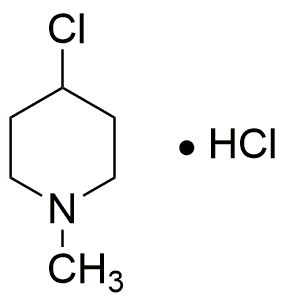4-Chloro-1-methylpiperidine hydrochloride is widely utilized in research focused on:
- Synthesis of Pharmaceuticals: This compound serves as an important intermediate in the synthesis of various pharmaceutical agents, particularly in the development of drugs targeting neurological disorders.
- Research in Organic Chemistry: It is commonly used in organic synthesis reactions, allowing chemists to create complex molecules with specific properties, enhancing the efficiency of research projects.
- Development of Agrochemicals: The compound plays a role in the formulation of agrochemicals, contributing to the creation of effective pesticides and herbicides that improve crop yield.
- Material Science: It is applied in the production of specialty polymers and materials, offering unique properties that can be tailored for specific industrial applications.
- Biochemical Studies: Researchers utilize this compound in biochemical assays to study its effects on biological systems, aiding in the understanding of cellular mechanisms and potential therapeutic targets.
General Information
Properties
Safety and Regulations
Applications
4-Chloro-1-methylpiperidine hydrochloride is widely utilized in research focused on:
- Synthesis of Pharmaceuticals: This compound serves as an important intermediate in the synthesis of various pharmaceutical agents, particularly in the development of drugs targeting neurological disorders.
- Research in Organic Chemistry: It is commonly used in organic synthesis reactions, allowing chemists to create complex molecules with specific properties, enhancing the efficiency of research projects.
- Development of Agrochemicals: The compound plays a role in the formulation of agrochemicals, contributing to the creation of effective pesticides and herbicides that improve crop yield.
- Material Science: It is applied in the production of specialty polymers and materials, offering unique properties that can be tailored for specific industrial applications.
- Biochemical Studies: Researchers utilize this compound in biochemical assays to study its effects on biological systems, aiding in the understanding of cellular mechanisms and potential therapeutic targets.
Documents
Safety Data Sheets (SDS)
The SDS provides comprehensive safety information on handling, storage, and disposal of the product.
Product Specification (PS)
The PS provides a comprehensive breakdown of the product’s properties, including chemical composition, physical state, purity, and storage requirements. It also details acceptable quality ranges and the product's intended applications.
Certificates of Analysis (COA)
Search for Certificates of Analysis (COA) by entering the products Lot Number. Lot and Batch Numbers can be found on a product’s label following the words ‘Lot’ or ‘Batch’.
Numéro de catalogue
Numéro de lot/série
Certificates Of Origin (COO)
This COO confirms the country where the product was manufactured, and also details the materials and components used in it and whether it is derived from natural, synthetic, or other specific sources. This certificate may be required for customs, trade, and regulatory compliance.
Numéro de catalogue
Numéro de lot/série
Safety Data Sheets (SDS)
The SDS provides comprehensive safety information on handling, storage, and disposal of the product.
DownloadProduct Specification (PS)
The PS provides a comprehensive breakdown of the product’s properties, including chemical composition, physical state, purity, and storage requirements. It also details acceptable quality ranges and the product's intended applications.
DownloadCertificates of Analysis (COA)
Search for Certificates of Analysis (COA) by entering the products Lot Number. Lot and Batch Numbers can be found on a product’s label following the words ‘Lot’ or ‘Batch’.
Numéro de catalogue
Numéro de lot/série
Certificates Of Origin (COO)
This COO confirms the country where the product was manufactured, and also details the materials and components used in it and whether it is derived from natural, synthetic, or other specific sources. This certificate may be required for customs, trade, and regulatory compliance.


